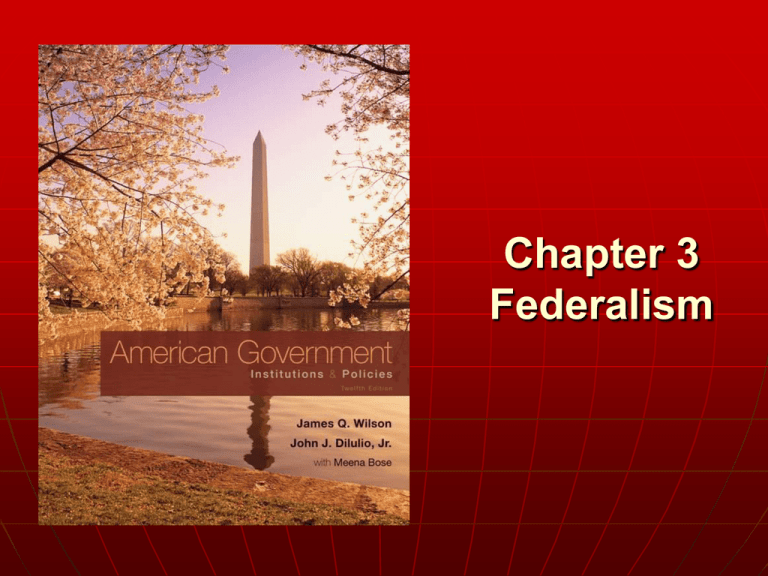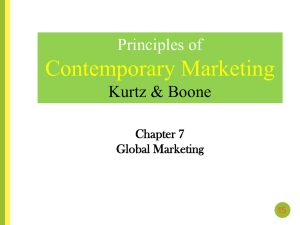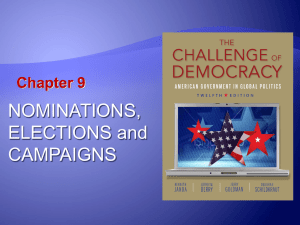Chapter 3
advertisement

Chapter 3 Federalism WHO GOVERNS? 1. Where is sovereignty located in the American political system? 2. How is power divided between the national government and the states under the constitution? TO WHAT ENDS? 1. What competing values are at stake in federalism? 2. Who should decide which matters ought to be governed mainly or solely by national laws? Copyright © 2011 Cengage Why Federalism Matters Federalism is a system in which the national government shares power with state/local governments. State governments have the authority to make final decisions over many governmental actions. The most persistent source of political conflict is between national and state governments. Copyright © 2011 Cengage Figure 3.1 Lines of Power in the Federal System of Government Copyright © 2011 Cengage Figure 3.1 Lines of Power in the Federal System of Government Figure 3.1 Lines of Power in the Federal System of Government The Founding A Bold New Plan: A “federal republic” for which there was no precedent Elastic Language Congress shall have the power to “make all laws which shall be necessary and proper for carrying into execution the foregoing powers.” -from Article I Copyright © 2011 Cengage The Debate on the Meaning of Federalism The Supreme Court Speaks Nullification Dual Federalism State Sovereignty Bowdoin College Museum of Art, Brunswick, Maine, Bequest of the Honorable James Bowdoin Copyright © 2011 Cengage Thomas Jefferson was an ardent supporter of states’ rights, p. 54 The Granger Collection At one time the states could issue their own paper money, such as this New York currency worth 25 cents in 1776. Under the Constitution, this power was reserved to Congress. p. 55 Governmental Structure The Granger Collection, New York Federalism has permitted experimentation. Women were able to vote in the Wyoming Territory in 1888, long before they could do so in most states, p. 62 Federalism: Good or Bad? Increased Political Activity What the States can do • Initiative • Referendum • Recall Copyright © 2011 Cengage p. 59 Copyright © 2011 Cengage Federal-State Relations Grants-In-Aid Meeting National Needs The Intergovernmental Lobby Categorical Grants Rivalry Among the States Copyright © 2011 Cengage David Young-Wolff/PhotoEdit Some of the nation’s greatest universities, such as the University of California at Los Angeles, began as land-grant colleges. p. 64 Source: Budget of the U.S. Government, Fiscal Year 2009. Copyright © 2011 Cengage New York police check backpacks as passengers enter a ferry when the city was on high alert in 2005. p. 65 Copyright © 2011 Cengage Figure 3.2 The Changing Purpose of Federal Grants to State and Local Governments Note: Totals may not add up to 100 percent because of rounding. Source: Budget of the U.S. Government, Fiscal Year 2007, table 12.1. Federal Aid and Federal Control Mandates Conditions of Aid Mario Tama/Getty Images Copyright © 2011 Cengage A Devolution Revolution? Devolution shifts many federal functions to the states. Most Americans favor devolution, but not if that means cuts in government programs that benefit most citizens. What have been the consequences of devolution? Copyright © 2011 Cengage Robin Nelson/Corbis A woman who heads a faith-based organization works with a jailed teenager to help him overcome his problems. p. 70 Copyright © 2011 Cengage Congress and Federalism WHY IS THERE SO MUCH POLITICAL AND POLICY DIVERSITY IN THE UNITED STATES? State and local governments have retained certain constitutional protections. Members of Congress think of themselves as representatives of localities to Washington, not as representatives of Washington to the localities. Copyright © 2011 Cengage WHAT WOULD YOU DO? MEMORANDUM To: Representative Sue Kettl From: Grace Viola, chief of staff Subject: Faith-based preemption bill As requested, I have researched state-funding policies. The main finding is that the state laws do hobble getting federal dollars to the religious groups that have been doing most of the actual recovery work. The immediate question before you is whether to sign on as a co-sponsor to the bill. Copyright © 2011 Cengage WHAT WOULD YOU DO? Arguments for: 1. Congress has already passed at least four laws that permit federal agencies to fund faith-based groups that deliver social services, subject to prohibition against using any public funds for proselytizing or such. 2. The faith-based organizations functioned as first responders when the hurricanes hit, and have since supplied billions of dollars worth of manpower and materials. 3. Some legal experts say that the existing laws already preempt the contrary state ones; besides, it polls great (75 percent in favor nationally, even higher in your district). Copyright © 2011 Cengage WHAT WOULD YOU DO? Arguments against: 1. You have traditionally argued in favor of states’ rights and the separation of church and state. 2. Praiseworthy though their civic good works have been, some of the religious groups involved in the cleanup and recovery have beliefs and tenets that seem discriminatory (a few even refuse to hire people of other faiths). 3. Expressly preempting more state laws could come back to bite us when it comes to state laws that we favor over contrary federal ones. Copyright © 2011 Cengage WHAT WOULD YOU DO? Your decision: Support bill? Oppose bill? Copyright © 2011 Cengage











